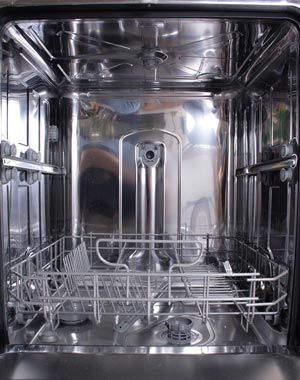Our companies are backed by the Best Pick Guarantee. Call one today!
Smart Appliances: The Dish on How Technology Works with Your Dishwasher
October 5th, 2015 byWhile it’s not unheard of for someone to enjoy washing dishes by hand, most people just pile them into their dishwashers in the evening and call it a day. Even so, low-quality dishwashers and incorrect loading practices sometimes unnecessarily waste energy and resources. Modern dishwashers, however, frequently include all sorts of bells and whistles that make using them easier and more efficient than ever before.
How Dishwashers Work
Dishwashers are one of the most common kitchen appliances, yet many homeowners do not have even a rudimentary understanding of how they work. The dishes will get clean without this knowledge, of course, but in case you’re curious, the dishwashing process generally consists of the following steps:

- Water is pumped through an ion exchanger to soften it before it fills up the bottom of the machine
- While the heating element at the base of the dishwasher heats the water, the detergent dispenser opens, allowing the cleaner to mix with the water
- The hot, soapy water is sprayed onto the dirty dishes via rotating spray arms
- The dirty water is drained out of the dishwasher and replaced with clean water
- The dishes are rinsed with the clean water
There are a few different types of dishwashers, although they all operate essentially the same way. Standard dishwashers are permanent under-the-counter fixtures that can accommodate eight or more place settings’ worth of dishes. Also available are compact built-in dishwashers, which take up about six inches less space but typically hold fewer dishes. Additionally, there are standard and compact portable dishwashers that can be rolled around and hooked up to the sink. You can even find microwave-sized units that fit on top of the counter.
Advances in Dishwasher Technology
Dishwashers have come a long way from where they used to be. In addition to “smart” dishwashers that can be controlled from a cell phone app, newer dishwashers often come equipped with the following features:
- Advanced rack design – Dishwasher racks are often set up to restrict where certain types and sizes of dishes can be placed. This allows the dishwasher to predict how much water pressure will be required for certain dishes and regulate where the water is directed.
- High-efficiency nozzles – Some dishwashers are designed to use less water through the use of water-efficient or high-pressure jets.
- Soil sensors – Dishwashers with soil sensors determine how much grime is in the water, on the dishes, or both, and they automatically pull in fresh water or adjust the water temperature and pressure accordingly. Some can even preselect wash settings based on how dirty the dishes are.
- Water filtration systems – Dishwashers equipped with advanced water filtration systems can remove grease and other food debris very quickly after they contaminate the water, ensuring nothing gets back on the dishes.
The right dishwasher for you depends largely on the size of your kitchen and how you intend to use it. Whether you’re shopping for your first dishwasher or replacing an old one, you should have no difficulties finding a machine with smart features that will make it a snap to use.


























